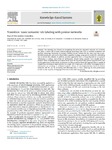Transition-based semantic role labeling with pointer networks

Use este enlace para citar
http://hdl.handle.net/2183/32764
A non ser que se indique outra cousa, a licenza do ítem descríbese como Atribución-NoComercial-SinDerivadas 4.0 Internacional
Coleccións
- Investigación (FFIL) [877]
Metadatos
Mostrar o rexistro completo do ítemTítulo
Transition-based semantic role labeling with pointer networksAutor(es)
Data
2023-01-25Cita bibliográfica
Fernández-González, Daniel (2023) : Transition-based semantic role labeling with pointer networks. Knowledge-Based Systems, vol. 260, 110127
Resumo
[Abstract] Semantic role labeling (SRL) focuses on recognizing the predicate–argument structure of a sentence and plays a critical role in many natural language processing tasks such as machine translation and question answering. Practically all available methods do not perform full SRL, since they rely on pre-identified predicates, and most of them follow a pipeline strategy, using specific models for undertaking one or several SRL subtasks. In addition, previous approaches have a strong dependence on syntactic information to achieve state-of-the-art performance, despite being syntactic trees equally hard to produce. These simplifications and requirements make the majority of SRL systems impractical for real-world applications. In this article, we propose the first transition-based SRL approach that is capable of completely processing an input sentence in a single left-to-right pass, with neither leveraging syntactic information nor resorting to additional modules. Thanks to our implementation based on Pointer Networks, full SRL can be accurately and efficiently done in
, achieving the best performance to date on the majority of languages from the CoNLL-2009 shared task.
Palabras chave
Natural language processing
Computational linguistics
Semantic role labeling
Neural networks
Deep learning
Computational linguistics
Semantic role labeling
Neural networks
Deep learning
Versión do editor
Dereitos
Atribución-NoComercial-SinDerivadas 4.0 Internacional
ISSN
0950-7051






